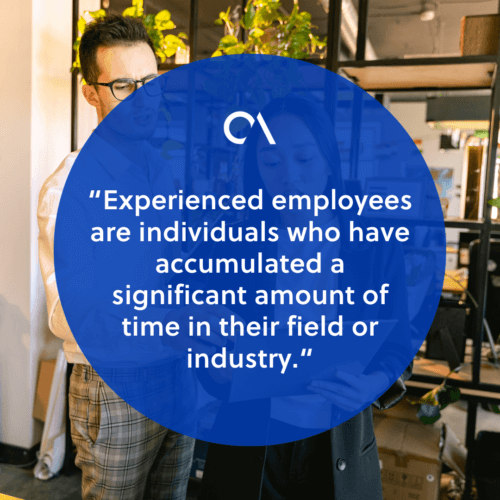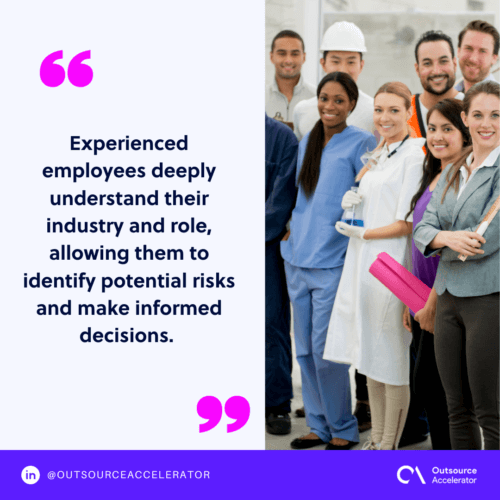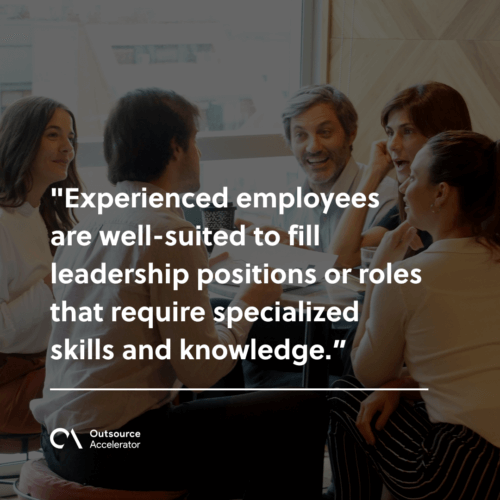Hiring experienced employees: What you need to know

Bringing the right people into your organization is crucial for success.
While hiring younger employees to train is usually the norm, having experienced employees in your wing can even bring better changes.
Experienced employees offer a wealth of knowledge, expertise, and skills that can significantly impact your business.
This article will delve into the ins and outs of hiring experienced employees.
What are experienced employees?
Experienced employees are individuals who have accumulated a significant amount of time in their field or industry. They have honed their skills and understanding, making them experts.
These employees have weathered numerous challenges and obstacles, gaining valuable insights and expertise along the way.
Apart from hiring passive candidates, experienced employees can be hired with the help of service providers such as SixEleven.

Reasons you should hire experienced employees
Here are primary reasons why companies should hire experienced employees:
Reduced training time and costs
Association for Talent Development revealed that employee training can cost an average of US$1,252. It can drive up or down depending on the new hire’s experience and skills and the complexity of training.
The advantage of hiring experienced employees lies in their ability to hit the ground running. They come equipped with the necessary skills and knowledge, minimizing the need for extensive training.
Enhanced productivity
Experienced employees have a proven track record of success. They deeply understand their work and have developed efficient strategies to overcome challenges.
Their familiarity with their field’s intricacies enables them to navigate tasks, leading to increased productivity easily.
Mentorship opportunities
Hiring experienced employees creates valuable mentorship opportunities within your organization.
Knowledge transfer can be easier, as these employees can share their knowledge, insights, and best practices with younger or less experienced team members.
Lower error rates
Experienced employees deeply understand their industry and role, allowing them to identify potential risks and make informed decisions. Their attention to detail and accuracy significantly reduces the likelihood of errors.

Immediate impact
Unlike new employees who may require a period of adjustment, experienced employees can immediately impact your organization.
Their expertise and industry knowledge allow them to provide valuable insights and suggestions and contribute to your company’s growth from day one.
Potential downsides to hiring experienced employees
On the other hand, hiring experienced employees on your wing can also bring potential downsides in different aspects.
Resistance to change
Experienced employees may have established routines and resist new ideas, processes, or technologies.
They may be more comfortable with familiar methods that have yielded past success. This resistance can hinder innovation and slow down progress.
Higher salary expectations
With experience comes the expectation of higher compensation. Experienced employees may demand higher salaries due to their expertise and market value.
While this can be justifiable, it is crucial to evaluate whether the added value they bring to the organization justifies the increased cost.
Overqualification for certain roles
In some cases, experienced employees may be overqualified for the positions they are hired for. This situation can lead to dissatisfaction and a lack of engagement, as they may feel underutilized.
It is essential to align their job responsibilities with their level of expertise to ensure job satisfaction and optimize their potential.
Limited adaptability
Experienced employees may have established habits and approaches that have served them well in the past.
While their expertise is valuable, evaluating their adaptability to new situations and changing market conditions is essential.
Less engagement
Studies also show that experienced employees, particularly the older generation, tend to engage less in the workplace these days. Qualtrix research found that 68% of Gen X workers considered work “less central to their lives” post-pandemic.
Lack of fresh perspective
Experienced employees may have deep knowledge within their specialty but may lack exposure to new trends and innovations. This limitation can hinder exploring unconventional solutions and thinking outside the box.
When to hire experienced employees
Hiring experienced employees can bring many benefits to your organization. Their reduced training time, enhanced productivity, mentorship opportunities, and lower error rates contribute to a high-performing workforce.
On the other hand, you have to consider the downsides and complexities of having them in your wing.
Knowing when to hire experienced employees is the key to maximizing their potential impact on your organization.
Here are some situations where bringing an experienced employee is beneficial.
- Business expansion. When your company is experiencing significant growth or expanding into new markets, hiring experienced employees can provide stability and support in managing the increased workload.
- Leadership gaps. Experienced employees are well-suited to fill leadership positions or roles that require specialized skills and knowledge. Bringing in an experienced employee during leadership hiring can provide the team stability, guidance, and mentorship.

- Complex projects. For complex projects that demand a high level of expertise, experienced employees can be invaluable. Their extensive knowledge and problem-solving skills enable them to take on challenging tasks, navigate complexities, and deliver successful outcomes.







 Independent
Independent




